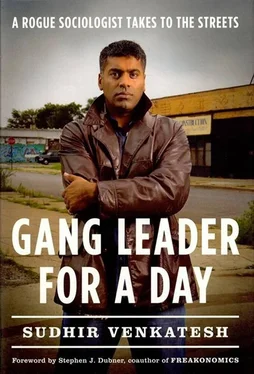“You can’t let them steal,” J.T. told me. “I liked your take on what happened. You’re right, they both fucked up. Since we don’t really know if Billy didn’t pay, I can’t beat him. But like you said, we do know that Otis stole something, because he didn’t deny it. So I had to punish him. I let him off easy, though. I told him he only had to work free for a week.”
I could hear Otis moaning in pain, like a sick cow. I asked quietlyif he was okay. Neither J.T. nor Price answered. As we drove past Billy and Otis, I was the only one who looked over. Otis still had his head down, and he turned away as we passed. Billy just watched us drive by, completely expressionless.
We spent the next several hours driving around the South Side, covering the great swath of territory controlled not just by J.T.’s faction of the Black Kings but by other gangs within the BK nation.
As J.T. rose within the BKs’ citywide hierarchy, part of his broader duty was to monitor several BK factions besides his own to make sure that sales proceeded smoothly and that neighboring gangs cooperated with one another. This meant that he now oversaw, directly or indirectly, several hundred members of the Black Kings.
There was a constant reshuffling and realignment of gang factions. This typically had less to do with dramatic events like a gang war and more to do with basic economics. When one local gang withered, it was usually because it was unable to supply enough crack to meet the demand or because the gang leader set his street dealers’ wages too low to attract motivated workers. In such cases a gang’s leadership might transfer its distribution rights to a rival gang, a sort of merger in which the original gang got a small cut of the profits and a lower rank in the merged hierarchy. If running a drug gang wasn’t quite business as usual, it was nevertheless very much a business.
Today was the day that J.T. needed to visit all the four- and six-man sales teams occupying the street corners, parks, alleyways, and abandoned buildings where the Black Kings sold crack. He did this once a week. Because these visits were perhaps J.T.’s most important work, it was pretty obvious that I wasn’t going to have much input.
But as J.T. drove to his first stop, he told me that I could at least tag along.
By now a second car had joined us, occupied by four junior gang members. They were J.T.’s security detail, driving ahead to each location and paging him to say it was safe from rival gangs.
As I watched J.T. question his sales teams, one after the next, I began to realize that he truly was an accomplished manager. All his members knew the drill. As soon as J.T. reached a site, the sales team’s director would approach him alone and instruct his troops to stop all sales activity. One member, taking all the cash and drugs, left the area entirely so that the police couldn’t link J.T. directly to the drug sales. It was unclear to me whether this was J.T.’s idea or standard practice in gangland, but when it came to avoiding the police, J.T. was meticulous.
In order to keep himself clear, he never carried a gun, drugs, or large amounts of cash. Even though he occasionally alluded to cops he knew personally, men who’d grown up with him in the neighborhood, he was always sketchy as to whether he held any real influence among the police. Whatever the case, he didn’t seem all that concerned about getting arrested. In his view the police could come after him whenever they wanted, but it was in their best interest to let familiar faces run the drug businesses. “They just want to control shit,” he told me, “and that’s why they really only come after us maybe once in a while.”
His street dealers, however, were constantly getting arrested. From a legal standpoint this was mostly a nuisance; from a business standpoint, however, it posed a disastrous disruption of J.T.’s revenue flow. If a dealer went to prison, J.T. sometimes sent money to his family, but he was also worried that the dealer might decide to give testimony to the police in exchange for a reduced sentence. J.T. was more generous when it came to dealers killed in the line of duty. He nearly always paid their families a generous cash settlement.
As he met now with each sales director, J.T. would begin by grilling him with a standard set of questions: You losing any of your regulars? (In other words, customers.) Anybody complaining? (About the quality of the crack.) You heard of people leaving you for others? (Customers buying crack from other dealers.) Anybody watching you? (The police or tenant leaders.) Any new hustlers been hanging around? (Homeless people or street vendors.) You seen any niggers come around? (Enemy gangs.)
After answering these questions, the director had to report on the sales activity over the past week: a summary of the week’s receipts, any drugs that had been lost or stolen, the names of any gang members who’d been causing trouble. J.T. was most concerned with the weekly drug revenues-not just because his own salary derived from these revenues but because of the tribute tax he had to send each month to his superiors. J.T. had told me earlier that his bosses occasionally changed their tax rate, even doubling it, for no good reason (at least no good reason that J.T. was ever told about). When this happened, J.T. had to dip into his own pocket. A few months before, he’d had to contribute five thousand dollars to help build up the gang’s arsenal of weapons, and he wasn’t at all happy about it.
These pressures, combined with his constant fear that his junior members were planning a coup d’état, made J.T. paranoid about being ripped off. He had told me of several such coups in other neighborhoods. So he practically interrogated his sales directors, asking the same question in a variety of ways or otherwise trying to trip them up.
“So you sold fifty bags, okay, that’s fine,” J.T. might start.
“No, I said we sold twenty-five,” the director would answer.
“No, you said fifty, I could have sworn you said fifty. Everyone else heard fifty, right?”
“No, no, no. I said twenty-five.”
Invariably J.T. and the young man directing his sales team-these directors were usually in their late teens or early twenties-would go back and forth like this for several minutes, often over a trivial detail, until J.T. felt confident that he was getting the truth. On this day, as the cold afternoon stretched into night, I watched several of these young men sweat under J.T.’s questioning. Surely they all knew by now what to expect of him. But even a hint of suspicion could earn them a “violation”: J.T. was quick to physically punish them or suspend their privileges-the right to carry a gun, for instance, or the right to earn money.
J.T. also asked his directors about any behavior in the past week that might have attracted the attention of the police-a dispute between a customer and a dealer, perhaps, or any gunfire. If one of his members had been suspended from high school or had drawn complaints from a tenant leader, he would have to submit to even tougher questioning from J.T.
For the directors, the worst part of this interrogation was that J.T. maintained his own independent sources. He kept a roster of informants in every neighborhood where the Black Kings operated. He had begun this practice when he first became responsible for monitoring neighborhoods that he didn’t know as well as his own. While he may have been familiar with the streets and stores in these neighborhoods, he didn’t know every pastor, tenant leader, police officer, and hustler as he did in his own.
Most of his informants were homeless people, squatters, or other hard-up adults. They came cheap-J.T. paid most of them just ten or fifteen dollars a day-and these ghetto nomads could easily hang out in drug areas and spy on J.T.’s gang members without raising suspicion.J.T. generally dispatched his senior officers to debrief these informants, but sometimes he met with them personally. Although they couldn’t tell him if his own members were stealing from him, they were valuable for reporting problems like street fights or customer complaints.
Читать дальше












